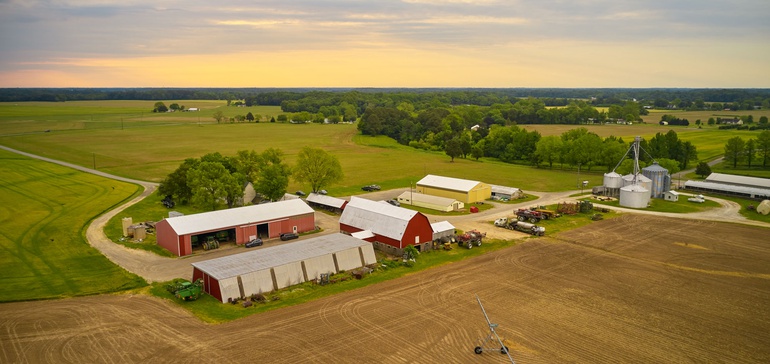Leveraging industry collaboration to support the future of food

Today’s consumers may be further from their food than they have ever been before. But with 70% of consumers now deeming it important to purchase food made with U.S.-grown crops, U.S. soybean farmers are working hard to provide the food industry with sustainable ingredients that not only meet company goals, but also rising consumer demands.
Belinda Burrier is a soybean farmer from central Maryland where she and her husband purchased their farm in 2002. Her work on the United Soybean Board and Maryland Soybean Board demonstrates her dedication to providing future generations with the tools and knowledge they need to support agriculture productivity levels, which needs to increase by 60-70% by 2050 to meet the increased food demand. In this interview, Burrier touches on importance of collaboration in the food industry and the important role U.S.-grown soy and soybean farmers play in the future of food.
What do you grow on your farm and what they used for?
BURRIER: I’ve been farming alongside my husband for almost 20 years growing wheat, corn, hay and soybeans. One thing that’s great about growing soybeans is farmers really have the choice on what variety to grow based on the demand for certain ingredients, which is why this year we transitioned to only growing high oleic soybeans. High oleic soy ingredients can extend products’ shelf life and offer a longer fry life, while featuring an improved fat profile, less saturated fats and no trans fats, and providing a neutral flavor which are all factors companies are looking for these days. We send our high oleic soybeans with a large food manufacturer where the oil is transformed into salad dressings.
How do you collaborate with others in the food supply chain and why is that important?
BURRIER: As farmers we work closely with people across the industry to make sure our crops meet product demands. By knowing what others in the industry are looking for, I can ensure the crops I grow meet their needs and even learn how I can make further improvements to support food companies’ growth as well as my own. The food industry really relies on collaboration, from our seed supplier to the mill operators and from the truck drivers to the crushers, we all work hand-in-hand to make sure we are developing and moving ingredients seamlessly onto consumer’s plates.
There is demand among food companies and consumers for more sustainable ingredients, what are you doing on your farm to meet those demands?
BURRIER: Sustainability has been at the forefront of consumers and food companies’ minds in recent years, but farmers have been utilizing sustainable practices for a long time. On our farm we use GPS and satellites to plant more precisely and biologicals, which are plant protection products created from living organisms, to support crop production and protection against pests and diseases. We also use grass strip water ways and buffer strips along our stream banks to help prevent floods from becoming too intense.
End users are looking more and more for sustainable products. In fact, 70% of consumers believe consuming foods produced using practices that contribute to the long-term health of the environment are important. Because of this shift, I always encourage consumers to buy U.S. produced foods, including those with soy ingredients. U.S. soybean farmers are committed to reducing the impact farming has on the environment.
As a farmer, what does sustainability mean to you and your farm?
BURRIER: Sustainability is really about giving farmers a future. It means my farm is going to be here for my grandkids to enjoy or even to work. It means providing food for our growing population and to keep families around the world fed. It means protecting our wildlife, water and soil. Sustainability means so many things and it has a direct impact on the livelihood and future of not just farmers, but communities around the world.
How are you supporting next generation farmers and what do you envision for the future of farming and food?
BURRIER: On our farm we choose to mentor the next generation and we currently have three different young farmers working with us. Farming isn’t a turnkey operation, you really need experience to learn about and get comfortable with the decisions that need to be made. We need current farmers to take the time to support and nurture our successors.
As an industry, we need to come together and educate consumers on where their food comes from. Getting them to visit farms and learn about the sustainable ways they can support farmers is going to be key to the future of food. So many people don’t realize that 98% of farms are family farms, not factory farms. U.S. farmers are working tirelessly to grow products to meet the rising demand for food while helping companies meet their sustainability and functionality goals. I’d love to see more consumers looking to buy U.S.-grown products to support U.S. farmers, local economies and help ensure jobs for the many individuals who play a role in providing the food that ends up on their plate.
To learn more about the supply chain collaboration and the critical role farmers play in the future of food visit soyconnection.com/lifewithoutfarmers.
Source: fooddive.com

